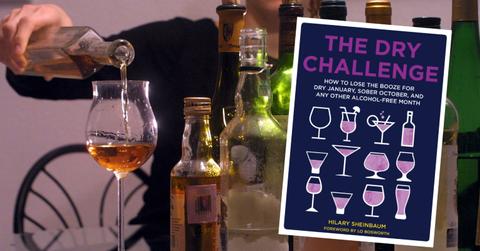 EXCLUSIVE
EXCLUSIVELose The Booze! 5 Tips On How To Stick To A Sober October

Oct. 2 2020, Updated 12:46 a.m. ET
It’s easy to reach for a glass of wine or a cocktail after work. However, dry months are becoming more and more popular, and the benefits of not drinking for one full month will only help you in the long run. In honor of Sober October, OK! has five tips on how to lose the booze for 31 days.
Hilary Sheinbaum, author of the The Dry Challenge: How to Lose the Booze for Dry January, Sober October, and Any Other Alcohol-Free Month — which comes out on December 29 — has done four Dry Januarys and two Sober Octobers, and she wants to "give people an option and open their minds to a different approach," she exclusively tells OK!. In fact, Sheinbaum, 32, spontaneously decided to participate in Dry January after she made a bet with one of her close guy friends on "who could go a month without drinking."
BALLROOM BODY BLITZ! DIET AND FITNESS SECRETS OF 5 DANCING WITH THE STARS STUNNERS
"I didn’t set out to do a cleanse, I didn’t set out to change my life, but after those 31 days, as silly and cliché as it sounds, it really just shifted my perspective about doing dry months and really alcohol consumption as a whole," she shares.
Sheinbaum also explains that people should get on the bandwagon since "Dry January and dry months is growing in popularity year after year." Even Lo Bosworth — who wrote Sheinbaum’s foreword — "had a positive experience with her dry challenge," Sheinbaum adds.
"I certainly think that her telling her story is going to be very inspiring for other people as well," she notes. "I think it’s great that somebody who has such a platform and that people look up to has had such a great experience trying Dry January. There’s only good that can really come from that."
JENNIFER ANISTON'S WORKOUT TRICKS & BEAUTY REGIMEN
In the meantime, here are some tips to get anyone started.
1. Hide The Booze — "It might sound very obvious, but hide your alcohol — even if you’re not drinking," the author reveals. "Store it away, just put it in a pantry or in a cabinet. You don’t have to necessarily give it away or pour it down the drain, but I think out of sight and out of mind helps if you’re feeling like you might need a drink. There is no reason to be tempted."
2. There Are Options! — "Choose alternatives to wine or beer or spirits," the journalist notes. "If you’re somebody who likes to wind down at the end of the day with a glass of wine, there are non-alcohol wines, there are non-alcoholic beers, there are also non-alcoholic spirits if you’re really into cocktails. Again, it also goes back to doing whatever is best for you and helps you succeed. You can satiate your craving without it involving booze."
Want OK! each day? Sign up here!
3. Build Habits — "If you are used to seeing your friends for happy hour at 6 p.m. on a weekday, instead of going to the bar or doing a Zoom call that involves alcohol, there are different ways to socialize with your friends," she says. "There are also different things that you can do on your own that don’t involve booze, so maybe it’s picking up a new workout regimen to replace that hour of time that you normally would be drinking or pick up a hobby like cooking. Venture out and see what you can do with your newly-found free time that doesn't involving sipping wine or cocktails."
KELLY RIPA REVEALS SHE'S SOBER — HERE'S WHAT WE KNOW ABOUT HER DECISION TO QUIT DRINKING
4. Recruit Friends — "It makes it so much easier," Sheinbaum confesses. "So for me, when I had this bet going with my friend, he was kind of what I call in the book part of the 'sober month support squad.' If he was like, 'I am going to a bar tonight,' I was like, 'Cool, you have these options' or 'good luck, I am here if you want to text me' and vice versa. You can also complain to your friends about whatever it is. Having someone to relate to is so important, and I think this goes for holding people accountable. It’s nice to have company."
5. Track How You Feel — "I think journaling is super important but certainly seeing how your body and mind and levels of anxiety adapt is key," she admits. "See how giving up alcohol affects you after week one, week two, week three, and then obviously up until the end. It’s very interesting to see how not drinking can impact just all aspects of your life. People also tend to lose weight when they’re not drinking because they’re not consuming those extra calories. I think it’s really motivating to see those changes — you can really look back on those past seven days to help you keep moving forward and see those small incremental changes as time goes on."
Cheers (without alcohol) to that!


